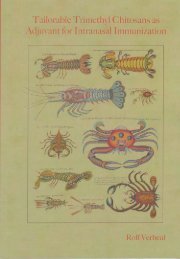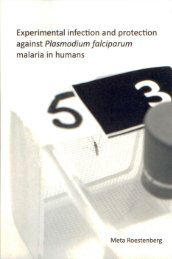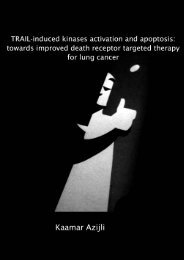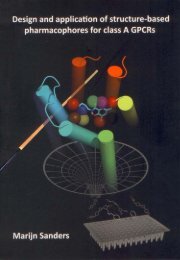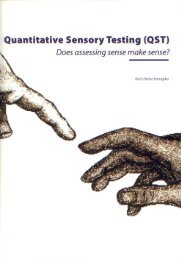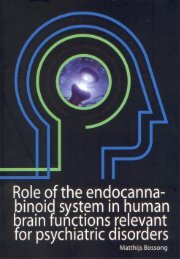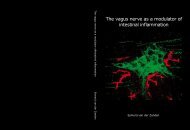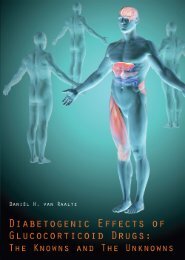TI Pharma Mid-Term Review Eindrapport
TI Pharma Mid-Term Review Eindrapport
TI Pharma Mid-Term Review Eindrapport
You also want an ePaper? Increase the reach of your titles
YUMPU automatically turns print PDFs into web optimized ePapers that Google loves.
Status update<br />
The committee was updated on the current status of<br />
<strong>TI</strong> <strong>Pharma</strong>. As the portfolio is fully up and running it<br />
was the right time for the ISRC to go through all projects<br />
in detail, as most projects have been up for 1 to 2 years.<br />
Recent additions to the portfolio include a project on<br />
phosphodiesterase inhibitors for use against certain<br />
neglected diseases, a project on renin blockade in the<br />
cardiovascular theme of the portfolio, and a project on<br />
lipid based drug delivery systems. One other project is<br />
in the process of contract signing. Furthermore, a joint<br />
call for proposals is ongoing, together with the Center for<br />
Translational Molecular Medicine and the BioMedical<br />
Materials program. The topic of this joint call is the<br />
interface between the three institutes: imaging guided<br />
and targeted drug delivery. The response to the call has<br />
been very good, with project proposals requesting up to<br />
five times the available budget. This is a clear signal for<br />
the need of public private partnerships. The ISRC looks<br />
forward to see the result of this joint call, in<br />
Also, a new IT platform was launched in September.<br />
The committee earlier indicated its enthusiasm for the<br />
use of an IT system to facilitate collaboration between<br />
project partners. With this new platform the committee<br />
is anxious to see whether further improvements in project<br />
management will be made.<br />
Scientific review of the entire portfolio<br />
In its first two meetings in spring and fall 2006 the ISRC<br />
concluded that <strong>TI</strong> <strong>Pharma</strong> runs a high quality, well balanced<br />
portfolio which adequately addresses most aspects of<br />
the Priority Medicines report. Based on the project progress<br />
reports of the first half of 2009 and the summaries<br />
of the ranking of projects by the <strong>TI</strong> <strong>Pharma</strong> Executive<br />
Board, the progress of the full <strong>TI</strong> <strong>Pharma</strong> project portfolio<br />
was reviewed by the ISRC. Two main questions served<br />
as a guiding principle in the discussions:<br />
• Is <strong>TI</strong> <strong>Pharma</strong> on its way to reach its mission and<br />
objectives?<br />
• Is the program on its way to reach the objectives set in<br />
the Priority Medicines report?<br />
An important point of attention in this review was the<br />
fact that the program is only running now for about<br />
two years, whereas science takes much longer to develop<br />
(for example, PhD students need four years at least to<br />
finish their PhD). For a program of this size and nature<br />
a longer timeframe than the current five years is essential.<br />
Each project has been discussed and feedback was recorded<br />
for each principal investigator. This feedback will be communicated<br />
by <strong>TI</strong> <strong>Pharma</strong> program management to the<br />
various projects. The detailed feedback per project is not<br />
included in this report for reasons of confidentiality. Three<br />
projects were to be sent out for (additional) expert review<br />
and three projects have been invited for further discussions<br />
with the ISRC at its April 2010 meeting.<br />
Overall conclusions and remarks<br />
The committee discussed the balance in the portfolio and<br />
the project size: should the portfolio be broad, or should<br />
it have more focus? The dual strategy of forming (large)<br />
platform projects in which all relevant groups are joining<br />
forces; and dedicated (smaller) projects to address specific<br />
issues was considered on balance to be a good one.<br />
With respect to the research matrix of Themes and<br />
Disciplines, the FES proposal includes a further consolidation<br />
and focus: consolidation in the enabling technologies<br />
which are reduced from six to three disciplines, and<br />
a focus in therapeutic areas by confining the oncology<br />
theme to new therapeutics only, with no new projects in<br />
cardiovascular diseases. The ISRC endorses these choices,<br />
except for the fact that projects on diabetes and metabolic<br />
syndrome (both on the Priority Medicines list) should be<br />
welcomed in the cardiovascular disease area.<br />
<strong>TI</strong> <strong>Pharma</strong> should ask for copies of medical ethical<br />
approval of projects, not to cause an additional bureaucratic<br />
burden but to make sure approval is in place.<br />
In this respect, a general point of concern is raised which<br />
is reflected in the progress of a number of projects: the<br />
long time it takes to get (ethical) approval for clinical<br />
studies. This takes much longer in Europe than in the<br />
USA and of Europe countries the Netherlands is not one<br />
of the speediest. The ISRC would like to stress the fact<br />
that this may hamper the position of the Netherlands to<br />
attract investments from the pharmaceutical industry.<br />
These investments are clearly triggered by the attractiveness<br />
of the public-privatepartnership model of<br />
<strong>TI</strong> <strong>Pharma</strong> itself.<br />
Finally, the ISRC would like to point out that no evidence<br />
is seen of any inappropriate industry pressure on the content<br />
or direction of the research projects.<br />
Appendix 3 - ISRC report<br />
29



